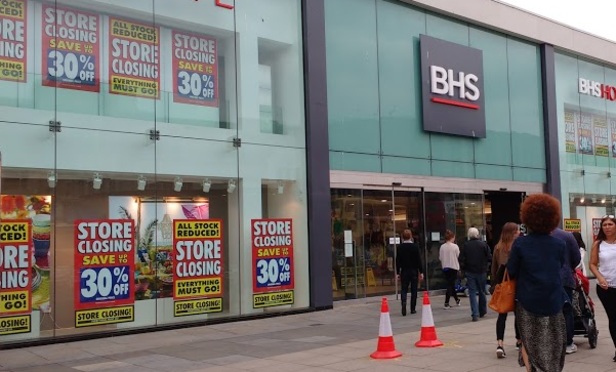Olswang and Linklaters criticised by MPs for 'cursory checks' on BHS sale
MPs lay the blame for the collapse of the high street stalwart squarely at the feet of Sir Philip Green
July 25, 2016 at 07:45 AM
3 minute read
Olswang and Linklaters have been criticised for the "cursory nature" of their checks into Dominic Chappell, the director of Retail Acquisitions Limited (RAL), which took over BHS last year prior to its collapse. In the Parliamentary Select Committee report into the collapse of the retailer, the firms were criticised for the checks they carried out into Chappell, a bankrupt with no retail background.
The report, released today (25 July), states that firms were there to advise and "not to provide an expensive badge of legitimacy to people who would otherwise be bereft of credibility", which it says is what had happened.
The report adds: "In the case of BHS, it appears that advisory firms either did not consider the reputational risk or demonstrated a remarkable level of 'group-think' in relying solely on each other's presence."
It also cites a handwritten note from a call between Linklaters and Olswang regarding Chappell as evidence of the "cursory nature" of the checks into his background as a business owner.
While it praises Olswang's due diligence into BHS, describing it as "detailed and rigorous", it adds: "Grant Thornton and Olswang were increasingly aware of RAL's manifold weaknesses as purchasers of BHS. They were nonetheless content to take generous fees and lend both their names and their reputations to the deal."
The report also criticises Olswang and Grant Thornton's decision to cite legal privilege, which had not been waived by Chappell, as a reason for not disclosing some information to the committee. It says that while firms' ability to provide confidential advice was important in a matter of clear public interest, such as BHS's collapse, disclosure of confidential or privileged information was necessary.
It adds that the firm adopted "a very wide interpretation of confidentiality", which included sending substitute witnesses to evidence sessions and refusing to provide details of fees earnt. Olswang's general counsel Stephen Hermer appeared before MPs on 25 May, when corporate partner David Roberts had been scheduled to appear.
It concludes: "We regret that Olswang and Grant Thornton sheltered behind these duties [of confidentiality and privilege] when their interests – and that of the public – would have been better served by full and frank disclosure to legitimate parliamentary scrutiny."
Speaking to Legal Week following a hearing on 23 May, Frank Field, chair of the Work and Pensions Select Committee, expressed his frustration at what he saw as a lack of detail in the partners' responses to questions.
Field said: "I just think it's too easy to claim privilege. It's just laziness and a cover-up."
The report laid the blame for the retailer's collapse squarely at the feet of Sir Philip Green.
Field said: "One person, and one person alone, is really responsible for the BHS disaster. While Sir Philip Green signposted blame to every known player, the final responsibility for up to 11,000 job losses and a gigantic pension fund hole is his. His reputation as the king of retail lies in the ruins of BHS."
Olswang and Linklaters declined to comment.
This content has been archived. It is available through our partners, LexisNexis® and Bloomberg Law.
To view this content, please continue to their sites.
Not a Lexis Subscriber?
Subscribe Now
Not a Bloomberg Law Subscriber?
Subscribe Now
NOT FOR REPRINT
© 2025 ALM Global, LLC, All Rights Reserved. Request academic re-use from www.copyright.com. All other uses, submit a request to [email protected]. For more information visit Asset & Logo Licensing.
You Might Like
View All
Linklaters Continues Renewable Energy Hot Streak With Latest Offshore Wind Farm Project
2 minute read
Trio of Firms Act On Chinese Insurer Ping An's $1.7B Stake Acquisition In Healthcare Arm

Hogan Lovells and Burges Salmon Secure Lead Roles in Largest Ever UK Defence Ministry Contract
2 minute readTrending Stories
- 1People in the News—Jan. 30, 2025—Rubin Glickman, Goldberg Segalla
- 2Georgia Republicans Push to Limit Lawsuits. But Would That Keep Insurance Rates From Rising?
- 3Trending Issues in Florida Construction Law That Attorneys Need to Be Aware Of
- 4The Importance of Judicial Elections
- 5Ephemeral Messaging Going Into 2025:The Messages May Vanish But Not The Preservation Obligations
Who Got The Work
J. Brugh Lower of Gibbons has entered an appearance for industrial equipment supplier Devco Corporation in a pending trademark infringement lawsuit. The suit, accusing the defendant of selling knock-off Graco products, was filed Dec. 18 in New Jersey District Court by Rivkin Radler on behalf of Graco Inc. and Graco Minnesota. The case, assigned to U.S. District Judge Zahid N. Quraishi, is 3:24-cv-11294, Graco Inc. et al v. Devco Corporation.
Who Got The Work
Rebecca Maller-Stein and Kent A. Yalowitz of Arnold & Porter Kaye Scholer have entered their appearances for Hanaco Venture Capital and its executives, Lior Prosor and David Frankel, in a pending securities lawsuit. The action, filed on Dec. 24 in New York Southern District Court by Zell, Aron & Co. on behalf of Goldeneye Advisors, accuses the defendants of negligently and fraudulently managing the plaintiff's $1 million investment. The case, assigned to U.S. District Judge Vernon S. Broderick, is 1:24-cv-09918, Goldeneye Advisors, LLC v. Hanaco Venture Capital, Ltd. et al.
Who Got The Work
Attorneys from A&O Shearman has stepped in as defense counsel for Toronto-Dominion Bank and other defendants in a pending securities class action. The suit, filed Dec. 11 in New York Southern District Court by Bleichmar Fonti & Auld, accuses the defendants of concealing the bank's 'pervasive' deficiencies in regards to its compliance with the Bank Secrecy Act and the quality of its anti-money laundering controls. The case, assigned to U.S. District Judge Arun Subramanian, is 1:24-cv-09445, Gonzalez v. The Toronto-Dominion Bank et al.
Who Got The Work
Crown Castle International, a Pennsylvania company providing shared communications infrastructure, has turned to Luke D. Wolf of Gordon Rees Scully Mansukhani to fend off a pending breach-of-contract lawsuit. The court action, filed Nov. 25 in Michigan Eastern District Court by Hooper Hathaway PC on behalf of The Town Residences LLC, accuses Crown Castle of failing to transfer approximately $30,000 in utility payments from T-Mobile in breach of a roof-top lease and assignment agreement. The case, assigned to U.S. District Judge Susan K. Declercq, is 2:24-cv-13131, The Town Residences LLC v. T-Mobile US, Inc. et al.
Who Got The Work
Wilfred P. Coronato and Daniel M. Schwartz of McCarter & English have stepped in as defense counsel to Electrolux Home Products Inc. in a pending product liability lawsuit. The court action, filed Nov. 26 in New York Eastern District Court by Poulos Lopiccolo PC and Nagel Rice LLP on behalf of David Stern, alleges that the defendant's refrigerators’ drawers and shelving repeatedly break and fall apart within months after purchase. The case, assigned to U.S. District Judge Joan M. Azrack, is 2:24-cv-08204, Stern v. Electrolux Home Products, Inc.
Featured Firms
Law Offices of Gary Martin Hays & Associates, P.C.
(470) 294-1674
Law Offices of Mark E. Salomone
(857) 444-6468
Smith & Hassler
(713) 739-1250










